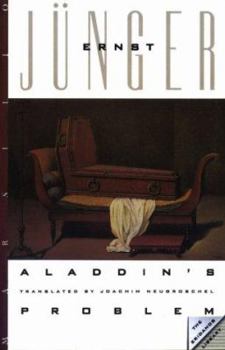Aladdin's Problem
Select Format
Select Condition 
Book Overview
Friedrich Baroh, is beset by problems. Anarch, aspiring entrepreneur, and amateur historian of ideas, the aristocratic Baroh is also, unfortunately, a soldier in the East German army. His eventual... This description may be from another edition of this product.
Format:Paperback
Language:English
ISBN:1568860269
ISBN13:9781568860268
Release Date:January 1996
Publisher:Marsilio Publishers
Length:136 Pages
Weight:0.55 lbs.
Dimensions:0.6" x 5.5" x 8.3"
Customer Reviews
2 ratings
Modern Man's Nakedness Exposed
Published by Thriftbooks.com User , 24 years ago
Ernst's Junger's "Aladdin's Problem" is a short, but brilliant, expose of the spiritual disease eating the West alive and a concise statement of the author's alleged solution. The cultural critique takes hold beneath the guise of a short retrospective memoir written in the 1980's by an East German army officer who has defected to the West and who eventually makes a quiet career in the mortuary services industry. He does well at this, until one day inspiration strikes - he decides to revive the ancient practice of interring the dead in "cities" of their own. He searches for a site for his universal necropolis, and settles on Cappadocia (in Turkey). The project, called "Terrestria", becomes wildly successful. However, as it drags on, the narrator becomes increasingly ill, until events reach a climax with the mysterious appearence of a sage who will impart wisdom to him. The meaning? Aladdin was a poor boy who gained great power. Or more accurately, he was a poor boy who gained a lamp with a demon in it that had great power and was bound to do his will. The underlying comparison between the Middle Eastern legend and the modern West is clear. The "Problem" alluded to in the title is that of technological nihilism. We Westerners, and by extention many other peoples around the globe, are in possession of technologies that put terrible forces at our command; Aladdin's problem - "What do I do with the demon whose might I barely control?" - is our problem. Whether Junger's solution was acceptable is more than I can right now say. But this book is as artful a diagnosis of the Western world's illness as you will find anywhere else.
A slim masterpiece
Published by Thriftbooks.com User , 26 years ago
This book is an absolute masterpiece. I rank it with the greatest short fiction of Dostoyevsky, Hamsun, Unamuno. It is the last novel of the writer whom the next century will regard as a monument of the twentieth--after all, he lived 102 years and was active all the while producing fictional and philosophical creations of unusual originality. He also kept a diary through the decades, and when he died at the beginning of 1998 one obituary called him "the chronicler of a century of horrors."ALADDIN'S PROBLEM is a slim volume, exceptionally terse, cryptic and understated even by Jnger's standards. It begins with brief meditations on growing old and flowers almost imperceptibly into the story of a funeral assistant who, troubled by the emptiness of modern life and the power of the forces above us ("Aladdin's problem"), conceives one of the most fantastic ideas for permanence in human history. You will stop in amazement when you discover it. From this point on he moves into a mystical realm with the aid of a suddenly appearing guru.Perhaps I've already told too much, but this book is written so precisely that you will savor every word and thrill at the author's world-conception as it builds. Jünger's art is so much his own that you quickly understand that you are dealing with a truly independent mind.Marsilio Publishers is performing a great service for American culture by publishing English translations of Jnger's works. It is a project on the level of publishing Jorge Borges in English in the 1960's. Let us hope that they will do an edition of Jnger's astonishing anti-utopian novel,THE GLASS BEES, which has been long out of print in translation.





